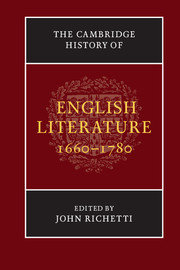Book contents
- Frontmatter
- Introduction
- PART I LITERARY PRODUCTION AND DISSEMINATION: CHANGING AUDIENCES AND EMERGING MEDIA
- PART II LITERARY GENRES: ADAPTATION AND REFORMATION
- PART III LITERATURE AND INTELLECTUAL LIFE: THE PRODUCTION AND TRANSMISSION OF CULTURE
- 14 History and literature 1660–1780
- 15 A preliminary discourse on philosophy and literature
- 16 Britain and European literature and thought
- 17 Religion and literature
- 18 Literary criticism and the rise of national literary history
- 19 Augustan England and British America
- PART IV LITERATURE AND SOCIAL AND INSTITUTIONAL CHANGE
- PART V LITERARY GENRES: TRANSFORMATION AND NEW FORMS OF EXPRESSIVENESS
- PART VI CONCLUSION
- Chronology
- Bibliographies
- Index
- References
19 - Augustan England and British America
from PART III - LITERATURE AND INTELLECTUAL LIFE: THE PRODUCTION AND TRANSMISSION OF CULTURE
Published online by Cambridge University Press: 28 March 2008
- Frontmatter
- Introduction
- PART I LITERARY PRODUCTION AND DISSEMINATION: CHANGING AUDIENCES AND EMERGING MEDIA
- PART II LITERARY GENRES: ADAPTATION AND REFORMATION
- PART III LITERATURE AND INTELLECTUAL LIFE: THE PRODUCTION AND TRANSMISSION OF CULTURE
- 14 History and literature 1660–1780
- 15 A preliminary discourse on philosophy and literature
- 16 Britain and European literature and thought
- 17 Religion and literature
- 18 Literary criticism and the rise of national literary history
- 19 Augustan England and British America
- PART IV LITERATURE AND SOCIAL AND INSTITUTIONAL CHANGE
- PART V LITERARY GENRES: TRANSFORMATION AND NEW FORMS OF EXPRESSIVENESS
- PART VI CONCLUSION
- Chronology
- Bibliographies
- Index
- References
Summary
In Boswell's Life of Johnson, under the year 1778, a reader comes across one of those Johnsonian outbursts that caused Boswell to compare his hero's temper to a warm West Indian climate. The context is entirely benign. Johnson has been discussing with the Quaker Mrs Knowles the nature of Christian friendship. Then, without warning, comes the explosion. ‘From this pleasing subject,’ reports Boswell, ‘he, I know not how or why, made a sudden transition to one upon which he was a violent aggressor; for he said, “I am willing to love all mankind, except an American:” and his inflammable corruption bursting into horrid fire, he “breathed out threatenings and slaughter;” calling them, “Rascals – Robbers – Pirates;” and exclaiming he'd “burn and destroy them.”’ When another lady present, Anna Seward, gently reproves his vehemence, the result is another explosion: ‘He was irritated still more by this delicate and keen reproach; and roared out another tremendous volley, which one might fancy could be heard across the Atlantick.’
Yet to any one who had read Johnson's Taxation No Tyranny, the most searching analysis of American claims produced by anyone writing on the side of George III and his ministers, the explosion would have come as no surprise. For by 1778 Johnson had honestly concluded that the American colonists were simply Englishmen long permitted by mere geographical accident to escape their normal civic responsibilities. They were now, in his view, hypocrites who were trying to make that advantage permanent by mobilising an exploded vocabulary of Whig principles left over from the previous reign.
- Type
- Chapter
- Information
- The Cambridge History of English Literature, 1660–1780 , pp. 498 - 524Publisher: Cambridge University PressPrint publication year: 2005

